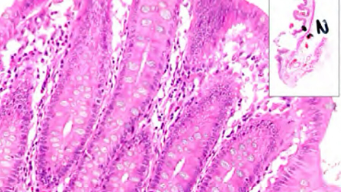

The research addresses the long-recognized poor prognosis of relatively undifferentiated cancers, suggesting that selection against differentiation and in favour of uncontrolled growth is a powerful driver of cancer progression. Goblet cells, which provide the mucous surface of the gut, are a crucial focus of this study. When present in colorectal cancers, these cancers are termed mucinous.
Key findings from the study include:
- Nearly 80 CRC-derived cell lines are classified into five categories based on the levels of MUC2 (the main mucous product of goblet cells) and TFF3 (an associated gene product).
- Identification of five distinct patterns of MUC2 and TFF3 expression, which can be easily identified in tumour specimens, allowing for a finer characterisation of CRCs concerning goblet cell differentiation.
- It was discovered that approximately 30% of all CRCs express TFF3 but not MUC2, a previously unrecognised subgroup.
- Highlighting the role of LGR5 in controlling differentiation rather than direct control of cell growth, challenging previous assumptions.
more recommended stories
 Pediatric Crohn’s Disease Microbial Signature Identified
Pediatric Crohn’s Disease Microbial Signature IdentifiedKey Points at a Glance NYU.
 Nanovaccine Design Boosts Immune Attack on HPV Tumors
Nanovaccine Design Boosts Immune Attack on HPV TumorsKey Highlights Reconfiguring peptide orientation significantly.
 High-Fat Diets Cause Damage to Metabolic Health
High-Fat Diets Cause Damage to Metabolic HealthKey Points Takeaways High-fat and ketogenic.
 Acute Ischemic Stroke: New Evidence for Neuroprotection
Acute Ischemic Stroke: New Evidence for NeuroprotectionKey Highlights A Phase III clinical.
 Statins Rarely Cause Side Effects, Large Trials Show
Statins Rarely Cause Side Effects, Large Trials ShowKey Points at a Glance Large.
 Anxiety Reduction and Emotional Support on Social Media
Anxiety Reduction and Emotional Support on Social MediaKey Summary Anxiety commonly begins in.
 Liquid Biopsy Measures Epigenetic Instability in Cancer
Liquid Biopsy Measures Epigenetic Instability in CancerKey Takeaways Johns Hopkins researchers developed.
 Human Antibody Drug Response Prediction Gets an Upgrade
Human Antibody Drug Response Prediction Gets an UpgradeKey Takeaways A new humanized antibody.
 Pancreatic Cancer Research: Triple-Drug Therapy Success
Pancreatic Cancer Research: Triple-Drug Therapy SuccessKey Summary Spanish researchers report complete.
 Immune Cell Epigenome Links Genetics and Life Experience
Immune Cell Epigenome Links Genetics and Life ExperienceKey Takeaway Summary Immune cell responses.

Leave a Comment